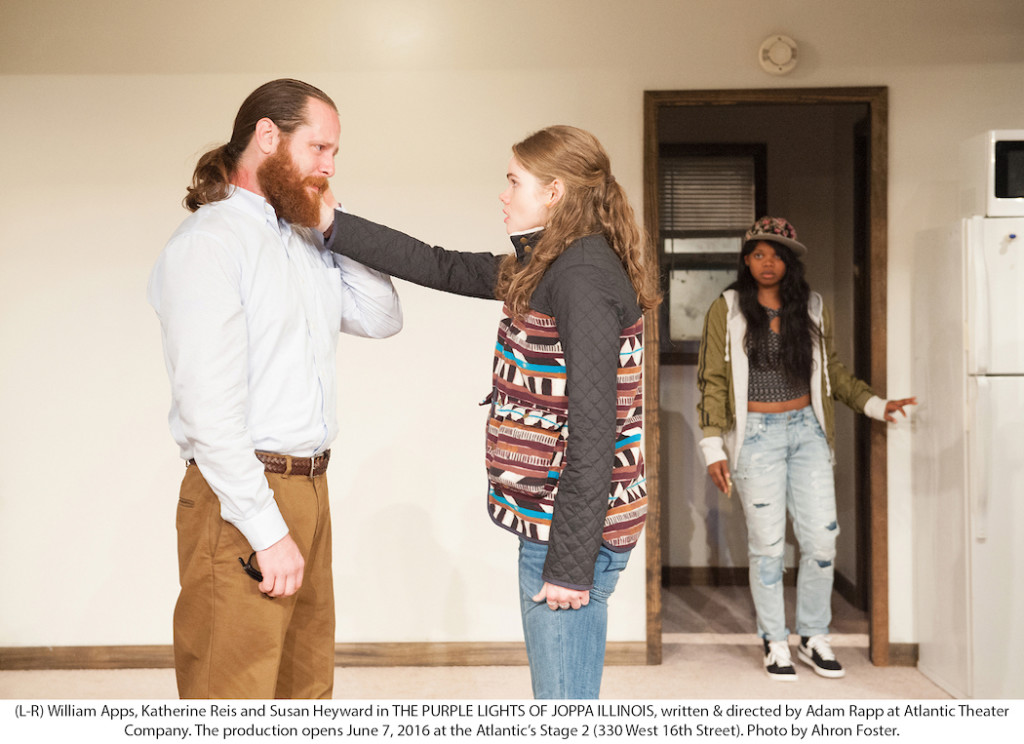by Michael Bracken
Bipolar affective disorder with psychosis. That’s the diagnosis for Ellis (William Apps), the central character in The Purple Lights of Joppa Illinois, at Atlantic Stage 2. We don’t really witness any evidence of his bipolarity. But we do get a glimpse of his mental instability and learn how it landed him in prison in Adam Rapp’s compact, affecting drama.
It’s a special day for Ellis. His thirteen-year-old-daughter, Catherine (Katherine Reis), whom he hasn’t seen since she was nine months old, is coming to visit. Ellis is understandably apprehensive, so much so that he fails to remove the external size tag from his new chinos and puts the air freshener in the freezer.
When Catherine arrives, she’s accompanied by her friend Monique (Susan Heyward), a slightly older girl brimming with attitude. Monique is protective of her buddy and armed with information (as well as a Taser gun) she got from her uncle, a prison guard. Initially, Catherine stays quiet while Monique and Ellis do the talking. But eventually Monique leaves the room so that father and daughter can connect.
It’s a slow and awkward dance. Catherine is still and Ellis ill at ease. They clearly want to get to know each other but it’s not easy for either of them. Both are tentative. Reis is touching as she navigates Catherine’s emotional landscape, wanting to claim her father, yet cautious. This is, after all, the man who abandoned her as an infant. She’s most animated when she talks about her mother (whom she always calls “my Mom”) describing her boyfriend, her makeup, and the size of her ass. Like many teenage girls, she finds Mom to be a good target for criticism.
Ellis, whose social skills are marginal at best, takes in every detail Catherine feeds him. Apps’s performance is generally subdued, so much so that there sometimes seems to be an energy void, but his muted affect rings true. At one point, however, after Monique has returned and his nurse, Barrett (Connor Barrett), has arrived, he thinks a lamp has been moved and he starts to lose it. His calm flies out the window. He goes after Monique with a hammer and she responds with the Taser, causing him to convulse on the floor.
Playwright Rapp also directs, and does so with glowing simplicity. There are no histrionics, no hearts worn on sleeves. Emotions speak for themselves, needing no embroidery.
All the actors are right on point, never overplaying. Tension is broken with humor, coming especially from Monique, who considers herself a linguist and likes to use big words, then ask her listener if they know what the words mean. Yet even she, a diva with a penchant for foul language, delivers her wisecracks without resorting to high drama.
Andromache Chalfant’s sparsely furnished set, with its small, fraying, plaid sofa, speaks volumes about Ellis: a simple man leading a simple life. Except that his life has not always been so simple. There’s a bracelet around his ankle monitoring him to ensure he does not go beyond a twelve-mile radius from his home. Unaware of what he was doing, he accidentally killed a young boy. He tells Catherine he left her out of fear he would harm her.
Except for the tussle between Ellis and Monique, not much happens in The Purple Lights of Joppa Illinois. A father and daughter reunite but there are no violins. The drama’s straightforwardness – both in the writing and the playing – causes it to really hit home.
Through Sunday, June 19, 2016, at Atlantic Stage 2 (330 West 16th Street). www.atlantictheater.org. 95 minutes, no intermission.























